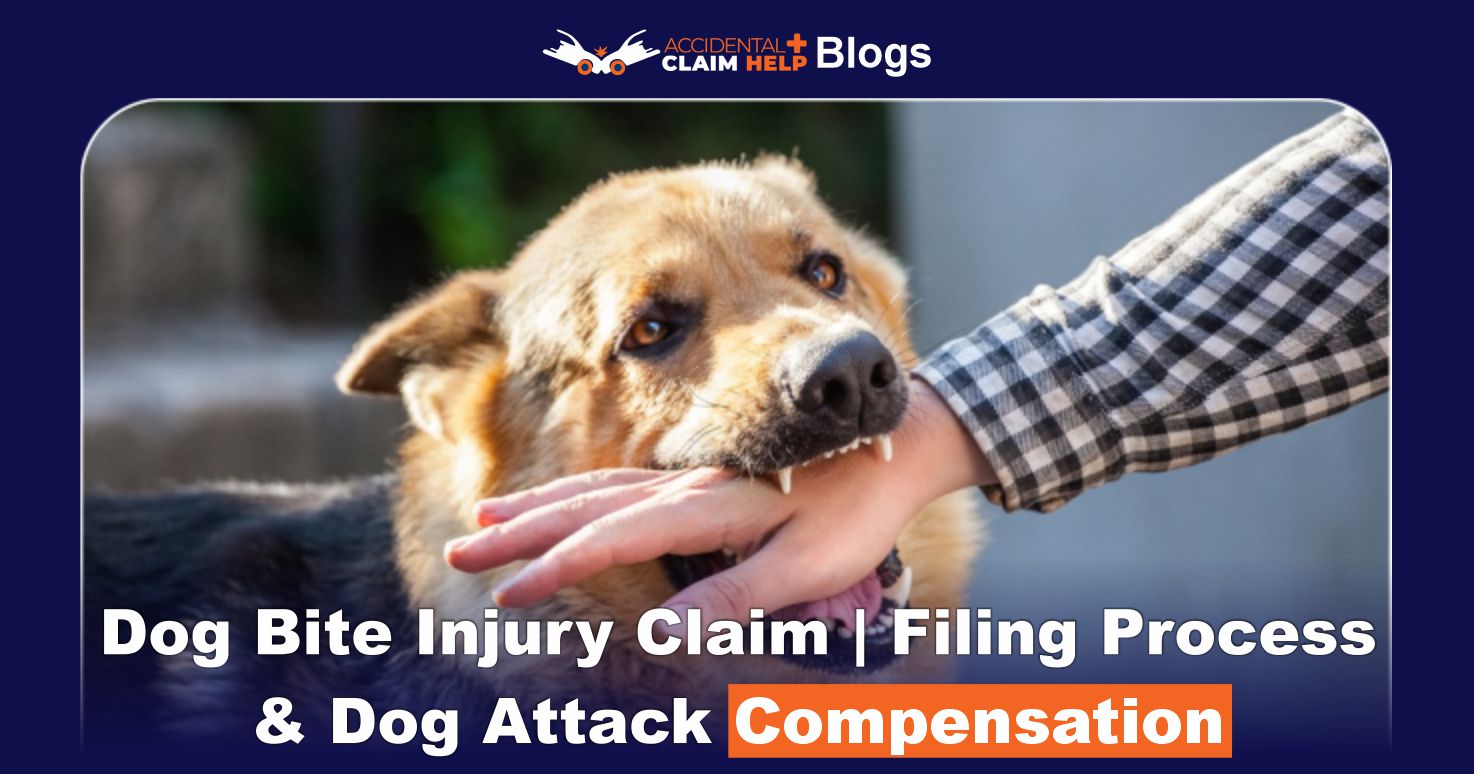Dog Bite Injury Claim | Filing Process & Dog Attack Compensation
Dog bites are common – over 4.5 million occur each year in the U.S., causing about 800,000 injuries that require medical attention. If you or a loved one has been bitten by a dog, you may be entitled to file a dog bite injury claim to recover damages. Victims can seek compensation for medical bills, lost income, pain and suffering, and other losses. The process involves documenting the incident, proving the dog owner’s liability, and working with insurance or filing a lawsuit if necessary.
How to File a Dog Bite Claim
Taking prompt, documented action is crucial after a dog bite. Follow these steps to build and file your claim:
Seek Medical Attention Immediately. Get professional medical care for any bite injuries, no matter how minor. Dog bites can easily get infected or cause hidden damage. Keep all medical records and bills, as they are key evidence.
Document the Incident. Take clear photos of your wounds, torn clothing, and the scene. Collect contact information and written statements from any witnesses. Note the dog’s description, owner’s name, address, and insurance details if possible.
Report the Bite. File a report with local animal control or police. An official report creates a record of the attack and may help your claim later. In many jurisdictions this report is required for the dog owner’s insurance claim.
Consult a Dog Bite Attorney. An experienced attorney can assess liability and help value your case. They will guide you on how to file a claim and handle negotiations or lawsuits on your behalf.
File an Insurance Claim. Typically, you (or your attorney) submit a claim against the dog owner’s homeowners or renters insurance. The carrier will investigate and may offer a settlement. If negotiations fail, your lawyer can advise filing a lawsuit to seek full compensation.
Keep Records of All Damages. Track every expense related to the bite – medical treatments, medications, therapy, lost wages, and even property damage. Document how the injury affects your life. Thorough records strengthen your claim.
Following these steps promptly maximizes your chances of a fair outcome. Missing evidence or delaying treatment can reduce compensation, so act quickly and methodically.
Dog Owner Liability and State Laws
In the U.S., dog bite liability is generally on the dog’s owner, but rules vary by state. Many states impose strict liability: the owner is automatically responsible for a bite, regardless of prior dog behavior. Other states use a “one-bite” rule or negligence standard: the owner is only liable if they knew (or should have known) the dog was dangerous or failed to exercise reasonable care.
All states hold owners responsible if someone is bitten while lawfully on the property and did not provoke the dog. Under strict-liability statutes, for example, Massachusetts makes owners liable even if it’s the dog’s first offense. In negligence states, the victim must show the owner was careless (e.g. an unleashed dog in a yard). If the bite victim provoked the dog or was trespassing, many states reduce or bar the owner’s liability.
Because laws vary, always consider local rules. A dog bite attorney familiar with dog bite law state by state can explain whether strict liability, one-bite, or negligence law applies in your state. In any case, if the owner is found liable, they (or their insurer) must cover the victim’s damages.
Compensation and Settlements
Dog bite victims can recover a range of damages. Compensation typically covers:
- Medical Expenses: All costs for treating the bite (ER visits, surgery, stitches, rehab, etc.).
- Lost Income: Wages lost while recovering from the injury.
- Pain and Suffering: Physical pain, scarring, disfigurement, and psychological trauma from the attack.
- Property Damage: Repair or replacement of torn clothing or other items damaged in the incident.
- Other Costs: Such as transportation to medical visits or future care needs.
Every case is unique, so award amounts vary widely. Data from insurers and law firms suggest average payouts often reach tens of thousands of dollars. For example, Insurance Information Institute data show the average liability claim for dog bites was about $58,500 in 2023. One survey reported an average U.S. dog bite settlement around $64,555 (2023). A personal injury firm’s analysis found an average of $97,518 (range ~$6,000–$400,000) based on real cases.
These figures only illustrate general ranges. Minor bites (nips with little harm) may resolve with small settlements, while severe attacks causing nerve damage or disfigurement can lead to six-figure awards. Courts often award higher damages when children are injured – judges recognize the added emotional trauma and scarring concerns for young victims. In short, compensation depends on injury severity, liability, evidence, and insurance coverage in your case.
Insurance Coverage: Homeowners and Renters
In most dog bite claims, the victim is paid by the dog owner’s insurance, not directly by the owner. Typically a homeowner’s or renter’s policy covers dog bite liability. Standard policies include personal liability coverage (usually $100,000–$300,000) that pays when someone on the premises is injured. For example, in most cases homeowners insurance covers dog bites and pays victims’ medical/legal costs up to the policy limit.
Similarly, renters insurance policies generally extend liability coverage to pet owners. In most instances, renters insurance covers dog bites under the tenant’s personal liability protection. This means if you rent with a pet, having renters insurance can protect you if your dog injures someone. It pays the medical bills and legal fees up to the limit.
If a claim exceeds insurance limits, the dog owner becomes personally responsible for additional damages. Note exceptions: some insurers exclude certain high-risk breeds or may refuse coverage if the dog has bitten before. Also, a homeowner’s policy won’t cover a bite to a member of the insured’s own household (those use health insurance). If a pet is used for business (grooming, breeding), the homeowner’s policy may not apply.
Who pays? Generally, the dog owner (through their insurer) pays for injuries. In limited cases, a landlord might share liability – for example if a landlord knew of a dangerous dog and failed to act. Otherwise, the owner’s insurance company adjusts and pays most dog bite claims. If the owner has no insurance, you may need to sue the owner personally, but insurers almost always pay when coverage exists.
Dog Bite Laws by State
There is no single federal law for dog bites; each state has its own statutes and case law. Some states follow strict-dog-bite statutes: for example, Florida and California treat any unprovoked bite as the owner’s liability. Other states adhere to negligence or “one-bite” rules, requiring proof the owner knew the dog was dangerous.
Because laws differ, outcomes can vary by location. For example, about 36 states have some form of strict liability law, while others require owner negligence. Exceptions (such as trespassing victims or police-dog scenarios) also vary. If you are bitten, check your state’s statute of limitations (usually 1–4 years) and laws. An attorney can explain the rules in your state and help build your case accordingly.
Special Considerations for Children
When a minor is bitten by a dog, the claim is typically filed by a parent or guardian. Insurance covers the same way as an adult victim. However, courts recognize that children suffer more from dog bites: injuries to a child’s face or body can cause lasting emotional and developmental harm. Studies show judges award higher damages for child victims, in part due to the psychological impact and concerns about scarring. (For example, Massachusetts law even presumes a child under 7 is not trespassing or at fault if bitten.)
If your child is bitten, seek medical care and document everything. A lawyer can help ensure all future care needs are accounted for in the claim. The same filing steps apply – report the bite, gather evidence, and claim against the dog owner’s insurance. Be mindful of any special deadlines: some states toll (delay) statutes of limitations for minors until they reach adulthood. Consulting an attorney can clarify any state-specific rules for minor injury claims.
Next Steps and Free Consultation
If you’ve been injured by a dog, don’t wait. A personal injury (dog bite) attorney can explain your dog bite claim process, answer questions, and handle the legal paperwork. Our experienced dog bite lawyers will review your case at no cost, explain your rights, and work to maximize your compensation.
Contact us for a free consultation. We’ll evaluate your dog bite injury claim, discuss liability and possible damages, and advise you on filing a claim or lawsuit. You pay nothing unless we win.







